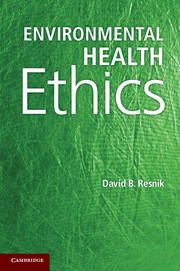Book contents
- Frontmatter
- Contents
- Figures and Tables
- Acknowledgments
- Abbreviations
- 1 Introduction
- 2 An Overview of Environmental Health
- 3 Ethical Theory
- 4 Toward an Environmental Health Ethics
- 5 Pest Control
- 6 Genetic Engineering, Food, and Nutrition
- 7 Pollution and Waste
- 8 The Built Environment
- 9 Climate Change, Energy, and Population
- 10 Justice and Environmental Health
- 11 Environmental health Research Involving Human Participants
- 12 Conclusion
- References
- Index
3 - Ethical Theory
Published online by Cambridge University Press: 05 July 2012
- Frontmatter
- Contents
- Figures and Tables
- Acknowledgments
- Abbreviations
- 1 Introduction
- 2 An Overview of Environmental Health
- 3 Ethical Theory
- 4 Toward an Environmental Health Ethics
- 5 Pest Control
- 6 Genetic Engineering, Food, and Nutrition
- 7 Pollution and Waste
- 8 The Built Environment
- 9 Climate Change, Energy, and Population
- 10 Justice and Environmental Health
- 11 Environmental health Research Involving Human Participants
- 12 Conclusion
- References
- Index
Summary
To understand the ethical issues in environmental health, it is necessary to have a good grasp of environmental health and ethics. Chapter 2 presented an overview of environmental health, and the next two chapters will focus on ethics. This chapter will provide the reader with some background in ethical theory, and Chapter 4 will develop a procedure for ethical decision making.
WHAT IS ETHICS?
Ethics can be defined as: 1) a set of standards (or norms) for distinguishing between right and wrong actions, or 2) the study of ethical standards. Ethical (or moral) concepts include such notions as obligation (or duty), virtue, justice, rights, happiness, value, and goodness. The study of ethics can be divided into four different areas: normative ethics, which examines general concepts and principles of ethics; applied ethics, which investigates ethical decision making in particular domains, such as medicine, science, or law; meta-ethics, which analyzes the meaning and justification of ethical concepts and principles; and empirical ethics, which studies moral reasoning, judgment, behavior, learning, and development. For many years, ethics has been predominantly the domain of humanistic disciplines, such as philosophy and theology, but now many empirical disciplines study ethics, including psychology, sociology, anthropology, economics, and sociobiology (Pojman 2005).
- Type
- Chapter
- Information
- Environmental Health Ethics , pp. 38 - 55Publisher: Cambridge University PressPrint publication year: 2012

